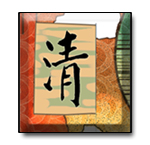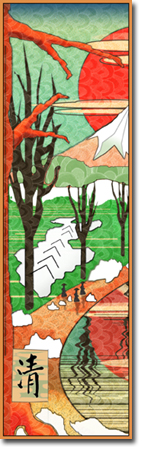On The Way: The Daily Zen Journal
The Hoshin-ji Sermons
Bankei (1622-1693)

Towards the end of autumn in the third year of Genroku (1690), Bankei crossed the Inland Sea to Marugame, and delivered talks at Hoshin-ji Temple.
What I teach everyone in these talks of mine is the unborn Buddha-mind of illuminative wisdom, nothing else. Everyone is endowed with this Buddha-mind, only they don’t know it. My reason for coming and speaking to you like this is to make it known to you.
Well then, what does it mean that you’re endowed with a Buddha-mind? Each of you now present decided to come here from your home with the desire to hear what I have to say. Now, if a dog barked beyond the temple walls while you’re listening to me, you’d hear it and know it was a dog barking. If a crow cawed, you’d hear it and know it was a crow. You’d hear an adult’s voice as an adult’s and a child’s voice as a child’s.
You didn’t come here in order to hear a dog bark, a crow caw, or any of the other sounds which might come from outside the temple during my talk. Yet while you’re here, you’d hear those sounds. Your eyes see and distinguish reds and whites and other colors, and your nose can tell good smells from bad.
You could have had no way of knowing beforehand of any of the sights, sounds, or smells you might encounter at this meeting, yet you’re able nevertheless to recognize these unforeseen sights and sounds as you encounter them, without premeditation. That’s because you’re seeing and hearing in the Unborn.
That you do see and hear and smell in this way without giving rise to the thought that you will, is the proof that this inherent Buddha-mind is unborn and possessed of a wonderful illuminative wisdom.
The Unborn manifests itself in the thought “I want to see” or “I want to hear” not being born. When a dog howls, even if ten million people said in chorus that it was the sound of a crow cawing, I doubt if you’d be convinced.

It’s highly unlikely there would be any way they could delude you into believing what they said. That’s owing to the marvelous awareness and unbornness of your Buddha-mind. The reason I say it’s in the “Unborn” that you see and hear in this way, is because the mind doesn’t give “birth” to any thought or inclination to see or hear. Therefore it is un-born.
Being unborn, it’s also undying. It’s not possible for what is not born to perish. This is the sense in which I say that all people have an unborn Buddha-mind.
Each and every Buddha and bodhisattva in the universe, and everyone in this world of humans as well, has been endowed with it. But being ignorant of the fact that you have a Buddha-mind, you live in illusion.
Why is it you’re deluded? Because you’re partial to yourself. What does that mean? Well, let’s take something close to home. Suppose you heard that your next door neighbor was whispering bad things about you. Every time you saw his face you’d immediately feel indignant. You’d think, oh, what an unreasonable, hateful person!
And everything he said would appear to you in a bad light. All because you’re wedded to your self. By becoming angry, losing your temper, you just transform your one Buddha-mind into the sinful existence of the fighting spirits.

If your neighbor praised you instead, and said something that pleased you, you’d be immediately delighted, even if the praise was totally undeserving and the pleasure you felt unfounded, a product of your own wishful thinking. The delight you experience when this happens is due to that same obstinate constitutional preference for yourself.
Just stop and look back to the origin of this self of yours. When you were born, your parents didn’t give you any happy, evil, or bitter thoughts. There was only your Buddha-mind. Afterwards, when your intelligence appeared, you saw and heard other people saying and doing bad things, and you learned them and made them yours.
By the time you reached adulthood, deep-set habits, formed in this way of your own manufacture, emerged. Now, cherishing yourself and your own ideas, you turn your Buddha-mind into the path of fighting spirits. If you covet what belongs to other people, kindling selfish desires for something that can never be yours, you create the path of hungry ghosts, and you change the Buddha-mind into that kind of existence. This is what is known as transmigration.
If you realize fully the meaning of what I’ve just said, and do not lose your temper, or think you must have this or decide you don’t like that, or have feelings of bitterness or pity—that in itself is the unborn Buddha-mind. You’ll be like a living Buddha.
It’s the same thing I always tell everyone about the Buddha-mind. I do it because when I was a young boy I tried very hard to attain the Buddha-mind myself. In the course of my practice, I sought help from Buddhist teachers. I had interviews with them and questioned them about the various doubts and uncertainties that arose in me. But nobody could give me any help.
So I went on practicing very hard. I did zazen. I went and lived in the mountains. I disciplined myself as severely as I possibly could. But none of it helped a bit. I didn’t get any closer to understanding the Buddha-mind.
Finally, when I was twenty-six years old, it suddenly came to me, and I arrived at my realization. I’ve been telling others about the unborn Buddha-mind ever since. I’m sure there’s no one else who can teach these things as thoroughly as I do.
You can gather from what I’ve told you that my practice lasted many long years and that I came to realize my Buddha-mind only after great hardship. But you can grasp your Buddha-mind very easily, right where you sit, without that long punishing practice. That shows the relation that links you to Buddhahood is stronger than mine was. You’re all very fortunate, indeed.
Ever since I realized the wonderful working of the Buddha-mind, I’ve been going around telling people about it. Many of them have become convinced of it too. Of course, it’s not something I learned from a Buddhist teacher, I discovered it on my own. And since I did, each time I tell others about it at these meetings, my words come from personal knowledge and experience.
Hearing about it only once or twice probably won’t be enough, so you should listen as many times as you need to. If you have any questions about it, ask them, and I’ll answer them for you.
Bankei (1622-1693)
Source – The Unborn The Life and Teachings of Zen Master Bankei





One of the simplest and most straightforward teachings, Bankei is a very unique and profound teacher. And yet, as simple as it reads or sounds, it is among the most challenging.
Another more contemporary teacher summed up the heart of Buddhism as being “Nothing whatsoever should be clung to as “I” or “mine,” stating that all the rest were perhaps “attempts to clarify the teachings, but not needed to get the heart of it all.”
There is also no mention of a lightning bolt style of the enlightenment experience, but the profundity of his insight/experience left no need for verification from anyone else. Reading that can be a slippery slope for us moderns, many of whom stop too soon in their search, becoming “self” satisfied that “well, This must be It!” and no further training is necessary. If we remember to walk on and keep waking ourselves up, we have a good chance of making it through the field of poppies here.
An interesting side note is that D.T. Suzuki is credited with bringing Bankei’s writings back to light after three hundred years of obscurity. His take on Bankei?
“Bankei Yotaku’s ‘Unborn Zen’ is the first truly original thought since the time Bodhidharma arrived in China in the sixth century…Indeed, Bankei must be numbered among the very greatest Zen masters.” This excerpt above is taken from the first translation in any language by Normal Waddell in 1984.
May our way be clear!
Elana, Scribe for Daily Zen